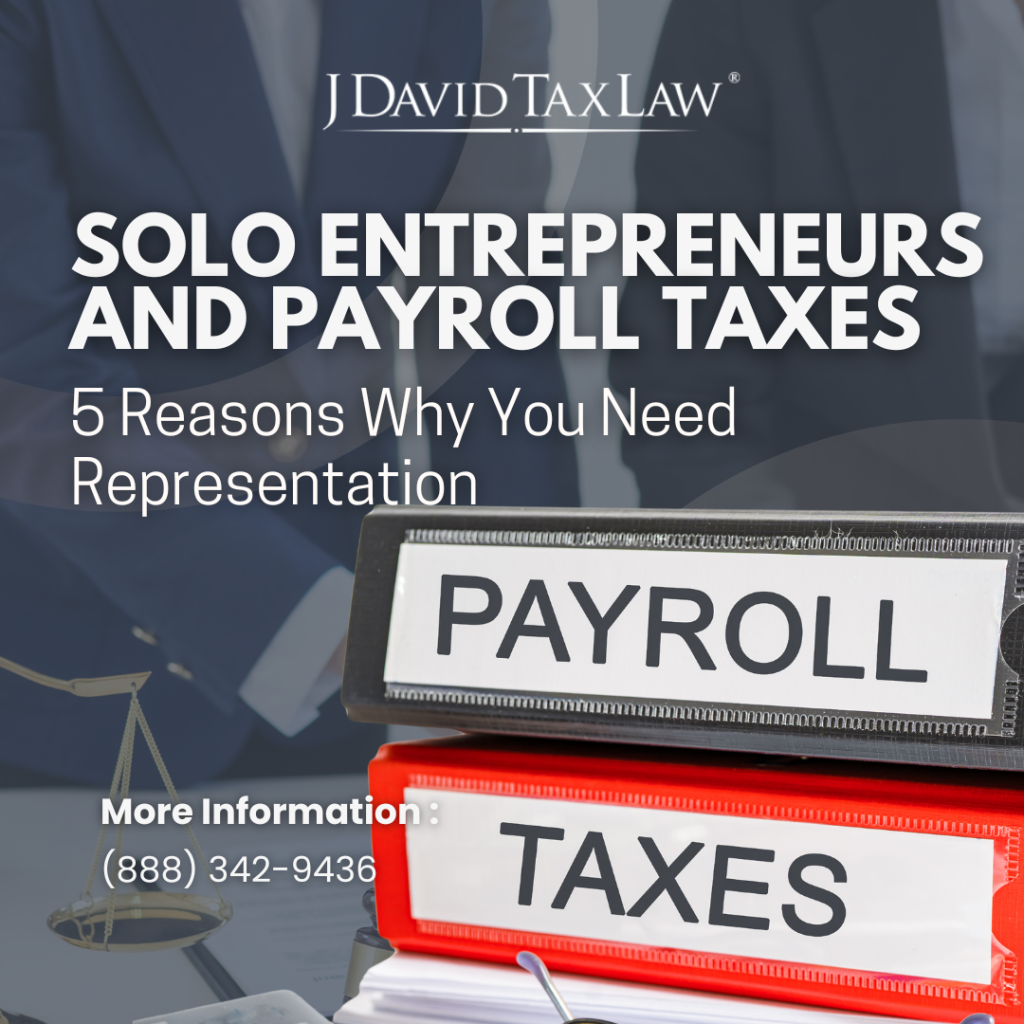Payroll taxes are a complex web of rules and regulations that can trip up even the most diligent solo entrepreneur. Mistakes in payroll tax management can lead to hefty fines and penalties, jeopardizing your business’s financial stability.
Every hour spent on managing payroll tax debt is an hour taken away from growing your business and serving your clients. With that, leveraging the expertise of a professional can free you from the complexities. In return, it allows you to focus on scaling your business.
Here are the five reasons why expert representation from J. David Tax Law in payroll taxes is a must not just for compliance but promoting business growth.
Payroll Tax Definition
Payroll taxes are taxes imposed on employers or employees, and are usually calculated as a percentage of the salaries that employers pay their staff. These taxes can consist of federal and state income taxes that are withheld by employers, as well as Social Security and Medicare taxes that are split between employers and employees. Essentially, payroll taxes are used to fund important social programs and are a critical component of the fiscal policy of governments. Managing these taxes correctly is important for both compliance and financial health of a business.
Complexity of Payroll Tax Laws
The payroll tax system and laws can be both confusing and overwhelming for any entrepreneur. It includes federal, state, and local requirements with each having its own set of rules and deadlines.
Keeping up with these regulations is no small feat, especially when they are frequently updated or modified. For example, the federal payroll taxes cover:
Social Security,
Medicare,
federal income tax withholding, and
the Federal Unemployment Tax Act (FUTA).
Each of these has specific rates, thresholds, and filing requirements that you must adhere to. On top of that, state and local employer payroll taxes can vary depending on where your business operates. Thus, adding another layer of complexity.
A payroll tax attorney can provide expert advice and ensure that you stay compliant with all relevant tax laws. J. David Tax Law will minimize your unpaid payroll tax obligations and resolve errors that can lead to penalties.
Time-Consuming Processes in Payroll Tax Management
The process of addressing payroll tax debt involves multiple steps, each requiring careful attention to detail. You must review past filings, correct any errors, calculate the correct owed amount, and submit the appropriate forms. This tedious work is essential to ensure that your tax debt is accurately assessed and properly resolved.
Review Past Filings
Scrutinize previous payroll tax records to spot any inaccuracies that need correction.
Correct Errors
Amend any mistakes to ensure all subsequent calculations are accurate.
Calculate the Owed Amount
Precisely determine the total payroll taxes owed, taking into account payroll tax rates and potential payroll tax deductions.
Submit Necessary Forms
Complete and submit the appropriate forms to accurately report your recalculated tax liabilities.
For solo entrepreneurs, managing these responsibilities can become unmanageable, increasing stress and the likelihood of errors, which could further complicate your tax situation.
At J. David Tax Law, we specialize in efficiently handling these complex processes. Don’t let payroll tax challenges slow you down. Call us today at (888) 342-9436 for expert assistance and relief.
Avoiding Penalties and Interest on Payroll Taxes
Entrepreneurs falling behind on unpaid payroll taxes can quickly escalate financial consequences to their business. Take note that the Internal Revenue Service (IRS) and state tax authorities impose stringent penalties and interest on unpaid or late payroll tax liabilities. This can compound the original debt and create a significant financial burden.
For instance, penalties for late or incorrect payroll tax filings can range from 2% to 15% of the unpaid tax. In addition, interest accrues on any unpaid amount from the due date until it is paid in full.
Professional representation can help solo entrepreneurs avoid these costly penalties and interest charges. In these cases, J. David Tax Law payroll tax attorneys can help you with the following:
identify and correct filing errors in your filings
work with tax authorities to negotiate reductions or eliminations of penalties
set up manageable repayment plans
Specialized Expertise in Payroll Tax Solutions
Payroll tax debt resolution requires specialized knowledge and expertise that solo entrepreneurs often lack.
Tax laws are complex and frequently changing, making it difficult to stay compliant and avoid further complications. Missteps in addressing payroll tax debt can lead to additional penalties, interest, and even legal issues.
This is where the expertise of a tax debt attorney becomes invaluable. They have the:
in-depth knowledge to analyze your specific situation,
identify the root causes of your tax debt, and
provide tailored advice on how to resolve it effectively.
A tax debt lawyer can guide you through the resolution process and ensure all necessary steps are taken to address your payroll tax issues.
5. Audit Support and Representation
The audit process involves an examination of financial records, payroll filings, and tax payments. Without expert support, an IRS tax audit can lead to further complications and increased penalties.
With this, a professional representation provides the necessary expertise to ensure your interests are protected.
Since they understand what auditors are looking for, they can help organize and present your financial records accurately. This professional support not only mitigates additional penalties but ensures that the audit process is less disruptive to your business operations.
Conclusion
Managing payroll tax debt is a significant challenge for solo entrepreneurs, but it is not a hopeless case. The complexities of payroll tax laws, penalties and interest risk, and the potential for audits make tax debt attorneys a wise investment. Engaging a payroll tax debt specialist can provide the expertise and support needed to navigate the resolution process smoothly.
Here at J. David Tax Law, we offer expert guidance to ensure that your payroll tax debts are managed effectively. This, in return, reduces financial stress and allows entrepreneurs to focus on their core business activities.
Contact us now to schedule a free tax consultation and take the first step towards achieving financial stability.





















